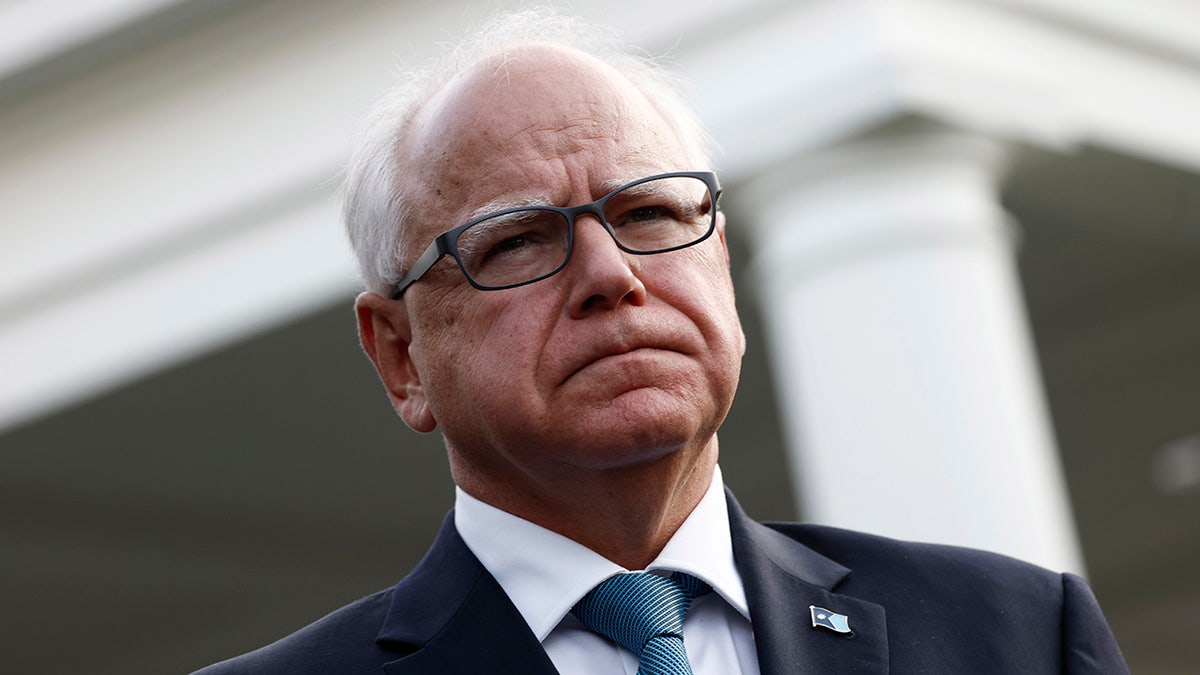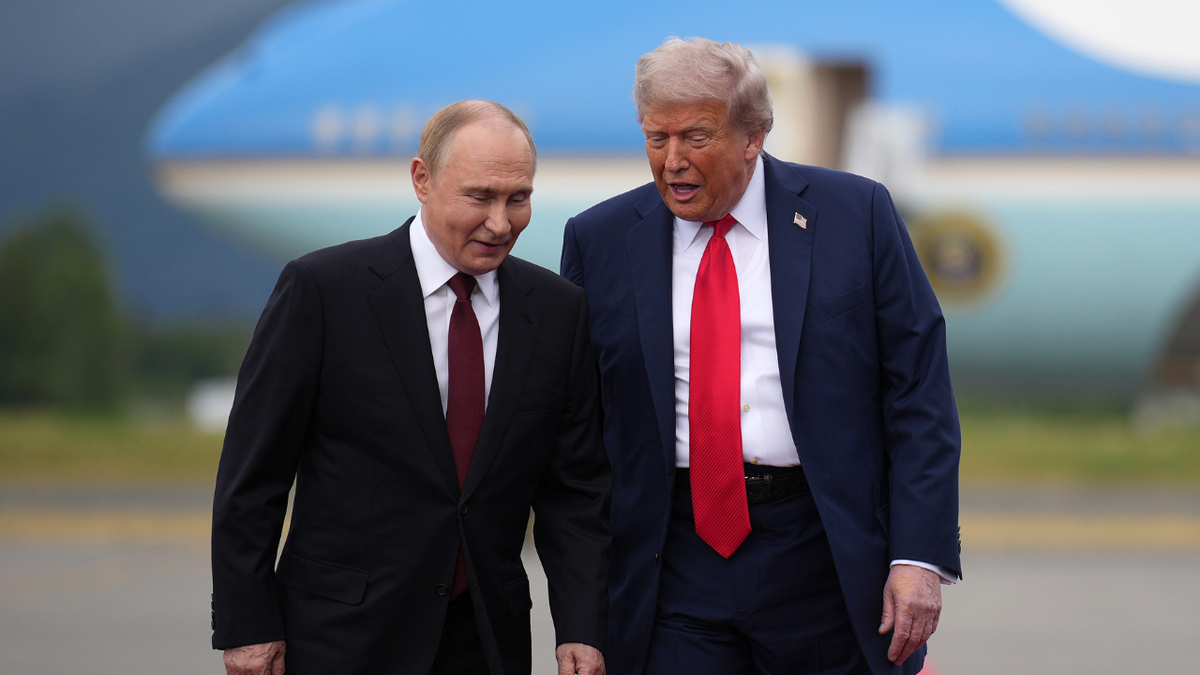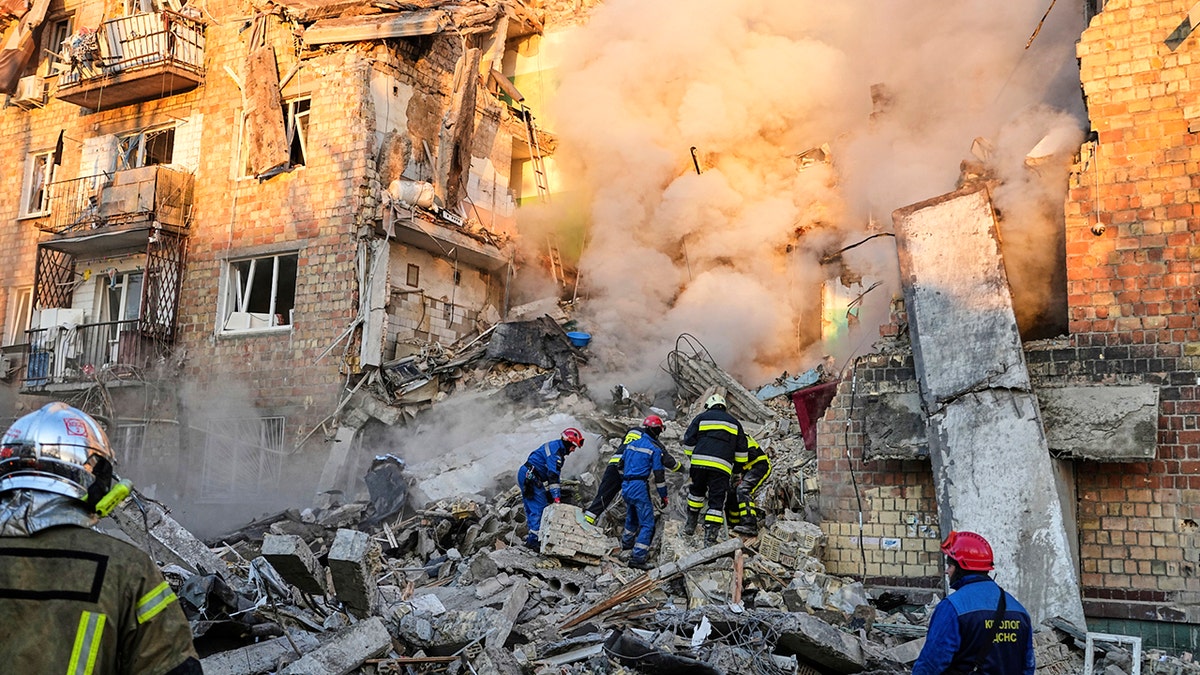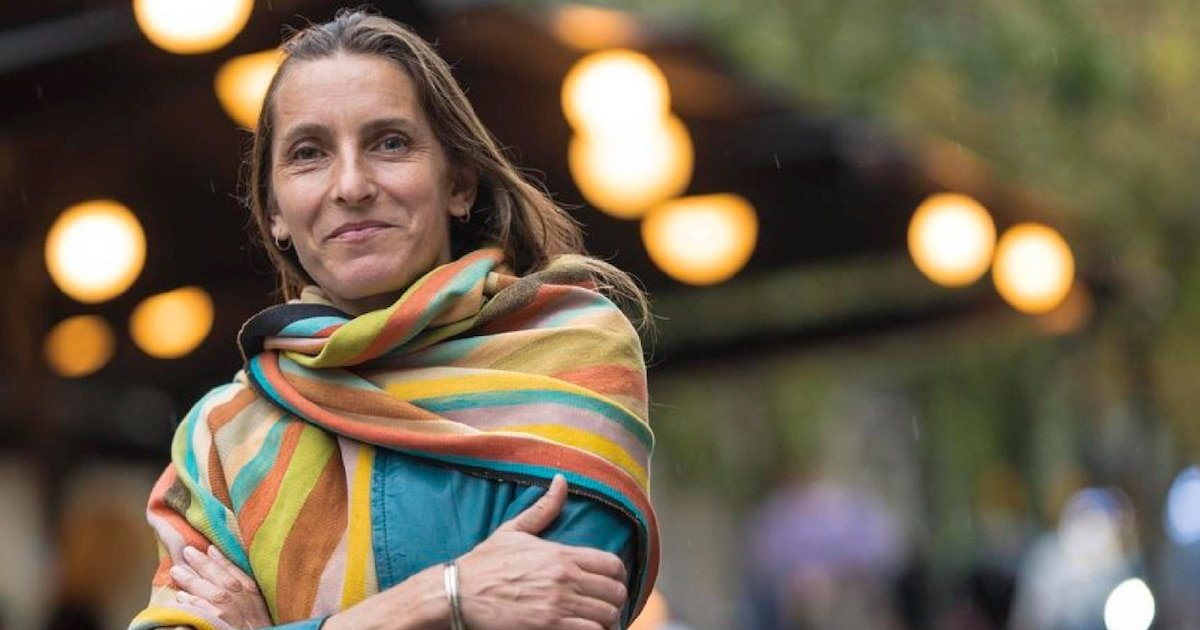INTERNACIONAL
Pope Leo XIV strongly supports US bishops’ condemnation of Trump immigration raids: ‘Extremely disrespectful’

NEWYou can now listen to Fox News articles!
Pope Leo XIV on Tuesday strongly affirmed U.S. bishops’ message condemning the Trump administration’s immigration sweeps, calling on Americans to listen to the migrants and treat them humanely and with dignity.
The pope was asked about the «special message» the U.S. Conference of Catholic Bishops adopted during their general assembly last week in Baltimore.
The bishops blasted President Donald Trump’s mass deportation agenda and the «vilification» of migrants, expressing concern over the fear and anxiety immigration raids stoking in communities, as well as the denial of pastoral care to migrants in detention centers.
«We are disturbed when we see among our people a climate of fear and anxiety around questions of profiling and immigration enforcement,» the bishops’ statement reads. «We are saddened by the state of contemporary debate and the vilification of immigrants. We are concerned about the conditions in detention centers and the lack of access to pastoral care,» reads the bishops’ statement, which also opposed «the indiscriminate mass deportation of people.»
US CATHOLIC BISHOPS VOTE TO OFFICIALLY PROHIBIT GENDER TRANSITION TREATMENT AT CATHOLIC HOSPITALS
Pope Leo XIV waves to the faithful after a special mass for the Jubilee of the poor, in St. Peter’s Square at The Vatican, Sunday, Nov.16, 2025. (AP)
Leo, the first American pope, said he appreciated the U.S. bishops’ message and encouraged Catholics and all people of goodwill to listen to treat migrants with dignity, even if they are in the country illegally.
«I think we have to look for ways of treating people humanely, treating people with the dignity that they have,» Leo told reporters. «If people are in the United States illegally, there are ways to treat that. There are courts, there’s a system of justice.»
The pope has previously urged local bishops to speak out on social justice concerns. Catholic leaders have been criticizing Trump’s mass deportation plan, as fear of immigration raids has slashed Mass attendance at some parishes.

Catholic leaders have been criticizing Trump’s mass deportation plan, as fear of immigration raids has slashed Mass attendance at some parishes. (Brendan SMIALOWSKI / AFP/Getty Images)
The federal government earlier this year reversed a Biden administration directive prohibiting immigration agents from carrying out raids at sensitive areas such as churches, schools and hospitals.
Leo acknowledged problems with the U.S. migration system, but he emphasized that nobody has argued for the U.S. to have open borders and that every country may choose who can enter and the methods to do so.
«But when people are living good lives, and many of them for 10, 15, 20 years, to treat them in a way that is extremely disrespectful to say the least — and there’s been some violence unfortunately — I think that the bishops have been very clear in what they said,» he told reporters as he left the papal country house south of Rome.
POPE LEO XIV CALLS OUT CHRISTIAN PERSECUTION AMID LATEST MASSACRE OF CIVILIANS IN AFRICAN NATION

The pope said he appreciated the U.S. bishops’ message and encouraged Catholics and all people of goodwill to listen to treat migrants with dignity. (Getty Images)
CLICK HERE TO DOWNLOAD THE FOX NEWS APP
«I would just invite all people in the United States to listen to them,» Leo added.
The bishops’ «special message» was the first time since 2013 they had drafted a single-issue statement at one of their meetings.
The Associated Press contributed to this report.
pope leo xiv,roman catholic,christianity,donald trump,immigration,illegal immigrants,politics
INTERNACIONAL
Minnesota taxpayer dollars funneled to Al-Shabaab terror group, report alleges

NEWYou can now listen to Fox News articles!
A new investigation found that Minnesota taxpayer dollars were going far beyond the North Star State’s borders and ending up in the hands of Al-Shabaab, an al Qaeda-linked terror group.
Ryan Thorpe and Christopher F. Rufo of the Manhattan Institute uncovered a web of fraud involving Minnesota’s Medicaid Housing Stabilization Services program, Feeding Our Future and other organizations in a bombshell report. Thorpe and Rufo noted that, in many cases, members of Minnesota’s Somali community were perpetrators of fraud. They added that federal counterterrorism sources confirmed that millions of dollars in stolen funds were sent back to Somalia, which is how Al-Shabaab got the cash.
Thorpe and Rufo sought to answer a bigger question when looking into the schemes: «Where did the money go?»
As it turned out, the Somali fraud rings sent money transfers from Minnesota to Somalia and, according to reports, approximately 40% of households in Somalia get remittances from abroad. Thorpe and Rufo state that in 2023, the Somali diaspora sent $1.7 billion to the country, which was higher than the Somali government’s budget that same year.
FOOD-STAMP FRAUD NUMBERS EXPOSE WHICH STATES ARE DRAINING THE MOST TAXPAYER DOLLARS
Women walk along a tree-lined street in Minneapolis’ Cedar–Riverside neighborhood, home to one of the largest Somali communities in the U.S. (Michael Dorgan/Fox News Digital)
Thorpe and Rufo discovered that the funds were being funneled to Al-Shabaab, an al Qaeda-linked terror organization. Multiple law enforcement sources informed the duo that Minnesota’s Somali community sent millions of dollars through a network of money traders known as «hawalas» that wound up in the hands of the terror group.
Glenn Kerns, a retired Seattle Police Department detective who spent 14 years on a federal Joint Terrorism Task Force, told Thorpe and Rufo that the Somalis ran a complex money network and were routing cash on commercial flights from the Seattle airport to the hawala networks in Somalia.
«We had sources going into the hawalas to send money. I went down to [Minnesota] and pulled all of their records and, well s—, all these Somalis sending out money are on DHS benefits,» Kerns told Thorpe and Rufo.
A confidential source told Thorpe and Rufo that «The largest funder of Al-Shabaab is the Minnesota taxpayer.»
«Every scrap of economic activity, in the Twin Cities, in America, throughout Western Europe, anywhere Somalis are concentrated, every cent that is sent back to Somalia benefits Al-Shabaab in some way,» a former official who worked on the Minneapolis Joint Terrorism Task Force told Thorpe and Rufo.
The HSS program was launched with the goal of helping those in need, but it turned into a fraud scheme. The program was initially estimated to cost $2.6 million, but in its first year it paid out more than $21 million in claims, according to Thorpe and Rufo. The costs only grew from there with the program paying out $61 million in claims in the first six months of 2025.
On Aug. 1, Minnesota’s Department of Human Services ended the program after finding that payment to 77 housing-stabilization providers were terminated over «credible allegations of fraud,» Thorpe and Rufo reported.
Just over a month after the program was shut down, then-acting U.S. Attorney for the District of Minnesota Joe Thompson announced criminal indictments for HSS fraud against Moktar Hassan Aden, Mustafa Dayib Ali, Khalid Ahmed Dayib, Abdifitah Mohamud Mohamed, Christopher Adesoji Falade, Emmanuel Oluwademilade Falade, Asad Ahmed Adow and Anwar Ahmed Adow. A U.S. Attorney’s Office spokesperson told Thorpe and Rufo that all six are members of Minnesota’s Somali community.

Somali national army soldiers escort members of the press to hideouts used by the terrorist group al-Shabaab in the Sabiid-Aanole areas, Somalia on June 23, 2025. (Abuukar Mohamed Muhidin/Anadolu via Getty Images)
SOCIAL MEDIA ERUPTS AFTER FAR-LEFT MAYOR GIVES VICTORY SPEECH IN FOREIGN LANGUAGE: ‘HUMILIATING’
Thompson said at a September news conference that the issue went beyond overbilling, rather they often involve «purely fictitious companies solely created to defraud the system.» Furthermore, those perpetrating the scam often targeted vulnerable individuals, such as people recently released from rehab, and signed them up for services that they allegedly did not plan to provide.
On Sept. 18, the same day the HSS indictments were announced, the U.S. Attorney’s Office announced a 56th defendant pleaded guilty in the Feeding Our Future fraud scheme. The number of defendants has only grown, with the U.S. Attorney’s Office announcing charges against a 77th defendant on Nov. 20.
Feeding Our Future received $3.4 million in federal funds disbursed by the state in 2019, but as COVID-19 hit, the organization rapidly expanded its number of sponsored sites, according to Thorpe and Rufo, who added that in 2021, Feeding Our Future received almost $200 million in funding.
«Using fake meal counts, doctored attendance records, and fabricated invoices, the perpetrators of the fraud ring claimed to be serving thousands of meals a day, seven days a week, to underprivileged children,» Thorpe and Rufo wrote in their report.
The funds were not going to the needy; rather, the money was being used to pay for luxury vehicles and real estate in the U.S., Turkey and Kenya, among other things.
When officials became suspicious of the nonprofit in 2020, Feeding Our Futures filed a lawsuit alleging racial discrimination related to outstanding site applications. In the suit, the nonprofit notes that it «caters to» foreign nationals, according to Thorpe and Rufo. They also note that «several individuals» involved in the scheme donated to Rep. Ilhan Omar, D-Minn., and that Omar’s deputy district director advocated for the group.

A street sign for «Somali St» is pictured with Riverside Plaza in the background in Minneapolis’ Cedar–Riverside neighborhood. (Michael Dorgan/Fox News Digital)
‘SQUAD’ DEM DISHES OUT CAMPAIGN CASH TO ANTI-ISRAEL NONPROFIT TIED TO ‘TERRORIST UNIVERSITY’
A few days later, Thompson announced an indictment in another fraud scheme, this time involving autism services for children.
Asha Farhan Hassan, a member of Minnesota’s Somali community, who has also been charged in the Feeding Our Future scam, is accused of playing a role in a $14 million scheme against Minnesota’s Early Intensive Developmental and Behavioral Intervention program. According to Thorpe and Rufo, Hassan and her co-conspirators allegedly recruited children from the Somali community for autism therapy services. Prosecutors suggested that Hassan would facilitate fraudulent autism diagnoses for children who did not have one.
The U.S. Attorney’s Office said that Hassan would use monthly cash kickbacks to drive enrollment and that payments ranged from $300 to $1,500 per month, per child.
«To be clear, this is not an isolated scheme. From Feeding Our Future to Housing Stabilization Services and now Autism Services, these massive fraud schemes form a web that has stolen billions of dollars in taxpayer money. Each case we bring exposes another strand of this network. The challenge is immense, but our work continues,» Thompson said in a statement.

Minnesota Gov. Tim Walz speaks to reporters after a meeting with then-President Joe Biden at the White House on July 3, 2024, in Washington, D.C. (Anna Moneymaker/Getty Images)
CLICK HERE TO DOWNLOAD THE FOX NEWS APP
Minnesota State Rep. Kristin Robbins, who is running to unseat Minnesota Gov. Tim Walz, shared Thorpe and Rufo’s report on X, writing, «Billions of our tax dollars have been stolen under [Tim Walz]. We need help from [Attorney General Pam Bondi, FBI Director Kash Patel] and our partners at [the U.S. Attorney’s Office] to find out if our state dollars are funding terrorism.»
Walz’s office did not immediately respond to Fox News Digital’s request for comment.
minnesota,terrorism,minneapolis st paul,investigations
INTERNACIONAL
Zelenskyy warns Ukraine faces ‘difficult choice’ as US peace plan hits major hurdle

Trump renews push for peace between Ukraine and Russia
State Department spokesman Tommy Pigott joins ‘America’s Newsroom’ to discuss President Donald Trump’s intentions to bring peace between Ukraine and Russia, including a reported deal that would ask Ukraine to cede more territory.
NEWYou can now listen to Fox News articles!
A U.S.-backed framework to end the Ukraine war — assembled by special envoy Steve Witkoff, with input through both Kyiv and Moscow channels — is stirring unease among European allies and putting fresh pressure on President Volodymyr Zelenskyy.
Zelenskyy, who has ruled out recognizing Russian sovereignty over Ukrainian land, delivered one of his starkest public messages yet, warning that Kyiv is entering «one of the most difficult moments in our history.»
In remarks released on Friday by Reuters, Zelenskyy said Ukraine is under intense pressure and may soon face what he called «a very difficult choice: either losing its dignity or risking the loss of a key partner. Either 28 difficult points or an extremely difficult winter — the most difficult one yet — and further risks. Life without freedom, without dignity, without justice. And we are expected to trust someone who has already attacked us twice.»
WITKOFF MEETS UKRAINE OFFICIALS IN NEW YORK AHEAD OF EMERGENCY UN SECURITY COUNCIL MEETING: ‘VERY PRODUCTIVE’
Ukrainian President Volodymyr Zelensky is greeted by US President Donald Trump (L) upon arrival at the White House West Wing in Washington, DC, on August 18, 2025. President Zelenskyy said today (Friday) Ukraine and the United States would «work on the provisions of the plan» and are ready for «constructive, honest and swift work.» (Photo by Andrew Caballero-Reynold / AFP via Getty Images))
Zelenskyy urged Ukrainians to remain disciplined as negotiations continue with Washington. «We will not make any loud statements; we will work calmly with America and all our partners,» he said. «I will present arguments, I will persuade, I will offer alternatives, but we will definitely not give the enemy any reason to say that Ukraine does not want peace, that it is disrupting the process, and that Ukraine is not ready for diplomacy. That will not happen.»
Warning of intensified attempts to divide the country, he said Ukrainians should expect «a lot of pressure — political, informational and other kinds of pressure — to weaken us,» but vowed that «we have no right to allow that,» and insisted, «we will succeed.»
A U.S. official, speaking on background, told Fox News Digital, «It was strongly implied to the Ukrainians that the United States expects them to agree to a peace deal. Any changes will be decided upon by the President himself.»
According to multiple outlets, a working draft would require Kyiv to cede the eastern Donbas region to Russia, limit long-range Western strikes inside Russia, and cap Ukraine’s armed forces at roughly 600,000 troops.
The White House says Witkoff and Secretary of State Marco Rubio have been «quietly working» on the plan and engaging both sides. President Donald Trump has been briefed and supports pushing to finalize the framework by the holidays.
Zelenskyy is preparing calls with Trump and German Chancellor Friedrich Merz as European leaders scramble to assess the proposal’s implications, after he held a call with U.S. Vice President Vance, source says.
Ukraine has formally received the document. Zelenskyy said Ukraine and the United States would «work on the provisions of the plan,» and that Kyiv is ready for «constructive, honest and swift work.» He has repeatedly ruled out recognizing Russian sovereignty over any Ukrainian territory, saying earlier there can be «no reward for waging war.»
«We are working to ensure that Ukraine’s national interests are taken into account at every level of our relations with partners,» Zelenskyy posted Friday on X, formerly known as Twitter.
ZELENSKYY SEEKS ‘STRONG REACTION’ FROM US IF PUTIN IS NOT READY FOR BILATERAL MEETING

President Donald Trump walks with Russian President Vladimir Putin as they arrive at Joint Base Elmendorf-Richardson Aug. 15, 2025, in Anchorage, Alaska. Kremlin spokesman Dmitry Peskov said today (Friday) Russia has «not received anything officially» from Washington on the 28-point plan. (Andrew Harnik/Getty Images)
A Ukrainian source told Fox News Digital that Kyiv’s red lines include limits on NATO membership, territorial concessions and troop cuts. The former senior Ukrainian official called the draft’s terms «political suicide» that would leave Zelenskyy responsible «for the loss of about one-fifth of Ukraine.»
In Moscow, Kremlin spokesman Dmitry Peskov said Thursday that Washington and Moscow are not yet discussing the proposals in detail, but that contacts were taking place. «There are certain ideas on the American side, but nothing substantive is currently being discussed. We are completely open — we maintain our openness to peace negotiations,» Peskov told reporters.
U.S. Ambassador to the U.N. Mike Waltz pressed for urgency during a Security Council briefing Thursday, saying diplomacy is «the only path to a durable and just peace.» Waltz said Washington has «proposed generous terms for Russia, including sanctions relief,» and vowed that «under President Trump’s leadership, the United States will continue to pursue a path to peace in Ukraine.»
Ukraine’s Deputy Representative to the United Nations, Khrystyna Hayovyshyn, pushed back firmly during Thursday’s Security Council meeting, declaring that Kyiv would reject any settlement that compromises its sovereignty. «There will never be any recognition, formal or otherwise, of Ukrainian territory temporarily occupied by the Russian Federation as Russian. Our land is not for sale,» she said. Hayovyshyn stressed that «Ukraine will not accept any limits on its right to self-defense or on the size and capabilities of our armed forces, nor will we tolerate any infringement on our sovereignty, including our sovereign right to choose the alliances we want to join.»
European leaders were caught off guard. The Associated Press reported that the leaders of Germany, France and the U.K. spoke with Zelenskyy Friday to reaffirm their «unchanged and full support on the way to a lasting and just peace» as diplomats scrambled to parse a U.S. proposal many first learned about through the media. Bild said Merz canceled a domestic appearance to hold crisis calls with both Zelenskyy and Trump.
CLICK HERE TO DOWNLOAD THE FOX NEWS APP

Firefighters work on the site of a burning building after a Russian attack in Kyiv, Ukraine, early Thursday, Aug. 28, 2025. (AP Photo/Efrem Lukatsky)
Zelenskyy is expected to speak with Trump in the coming days to discuss the plan’s core points and Ukraine’s red lines.
ukraine,russia,donald trump,volodymyr zelenskyy,vladimir putin,europe,conflicts
INTERNACIONAL
Lo “fácil” sería narrar un episodio de volación tras otro: lo que Neige Sinno hizo con el abuso de su padrastro

Esta entrevista, el encuentro real entre la periodista y la escritora, empieza de una forma muy rara. No con una pregunta, no con un comentario sobre el tiempo o el tránsito, no directo al grano, hablando del libro. La charla, en el patio de un hotel en el centro de la ciudad de Buenos Aires, a metros del Obelisco, arranca cuando la entrevistadora llega, se sienta, busca en su teléfono un poema y le pide a su entrevistada que lo lea. La entrevistada es Neige Sinno, es francesa, viene aquí en la gira de presentación de su libro Triste tigre, donde cuenta -y piensa- que su padrastro la violó desde los 6,7 años hasta los 12. El poema es Tamara Tenembaum, cuyo padre es una de las víctimas del atentado a la AMIA. Nada que ver. Pero…

Triste tigre
Audiolibro
El poema dice así: “Hay cosas / que para hacerlas / poemas / solo hay que contarlas. / Mi papá se murió / el día / que fue a la AMIA / a hacer el trámite / para enterrar a su papá / (mi abuelo) / en el cementerio / de La Tablada. / Listo”. Tal vez, piensa la periodista, lo que tiene para contar Sinno es tan enorme, tan fuerte, tan arrasador, que alcance con decirlo. La escritora -habla perfecto castellano, vivió en México- lee, dice “Guau”. Pero…
-Esa es la maldición, ¿no? -dice.
-Claro, no poder hablar.
-La idea de que no hay nada más que decir.
-¿Contra eso es Triste tigre?
-Es como una rebelión. La vocación de escritor es querer contar a pesar de todo. En algún momento pensar que no el mío no era un buen punto de vista. Estaría mejor estar un poquito de lado, ser la hermana… o alguien que vio. A nivel escritura sería más interesante. Y no, pues, me tocó estar ahí. Pero no me puedo quedar en este “listo”, en este “voilà”, porque hay más.
-¿Qué más?
-¿Qué pasa después? Y después, y después. Como los efectos en cadena que tuvo sobre todo el resto de mi vida, de la vida de esta persona que soy. Pero lo quise hacer es más complejo, como con más capas. Entonces, nos alejamos bastante en algunos momentos de lo que pasó para regresar…
“No solo queremos que se reconozca que existe esa experiencia: queremos castigo para los violadores y queremos que cambien las relaciones de poder. Y ser parte de ese cambio”
-La sensación es que vas descubriendo sentidos y los lectores también. Desde el principio está claro el propósito de no hacer algo solo testimonial y, definitivamente, no hacer algo de impacto, lo que sería muy fácil.
-De algún modo sería muy fácil. Qué raro decir eso, ¿no?
Sí, claro. Lo “fácil” sería narrar un episodio de violación tras otro. Neige no lo hace, aunque algo cuenta y alcanza. Parcamente, pero hay imágenes insoportables. Como cuando está mirando fotos de su infancia y dice: “Algunas horas después de las fotos, o antes, me llevó a un cuarto apartado y le hice una felación. No tuve que agacharme, solo estábamos él de pie y yo enfrente, ya que entonces apenas le llegaba a la cintura”. Por si alguien no entendía.
El hombre -nunca dice cómo se llama- se había encontrado con la madre de Neige cuando ella estaba separada, triste, con dos chicos. Y él llega, buen mozo y seductor. De a poco, se va dejando ver: “Es alto y fuerte. Brutal incluso. Su voz pasa fácilmente de la suavidad a la violencia. Cuando algo empieza a enfadarlo, grita. Grita fuerte. Da órdenes”. Él habla de los malos tratos recibidos, la nena en algún momento hasta se compadece. “Durante mucho tiempo lo percibí como un demiurgo, un ser más grande que la vida. Una criatura mitológica, un Sísifo, un Prometeo torturado por sus demonios. Más tarde, echando la vista atrás, pensé que tal vez solo era un pobre tipo que tenía el don de manipular a los demás y que se aprovechó de la vulnerabilidad de alguien aún más débil que él». En la familia lo miman, le dicen que sí para que no se enoje, que no estalle. Eso no es extraño, muchas familias lo hacen.

Pero Sinno, además de buscar qué pasa con este hombre que confiesa en el juicio por violación de una menor, va más allá. El silencio, el poder, el miedo, la sujeción económica, la fuerza de una personalidad que hace que lo traten como “Es un buen tipo que violó a una nena”. Un tipo al que “el mal paso” no lo condena a la soledad: cuando sale de la cárcel una mujer se casa con él y tiene cuatro hijos.
Ella, en cambio, se siente señalada, avergonzada. “El tabú en nuestra cultura no es la violencia sexual en sí, que se comete con frecuencia, sino hablar de ella, pensarla, analizarla”, escribe. Pero seguimos en el patio del hotel:
-La gente te cuenta cosas, sus historias…
-Sí, incluso gente que tiene otros traumas de otro tipo. Hay personas a las que, después de leer el libro, después de un tiempo, le aparecieron ciertas imágenes, recuerdos olvidados y sensaciones extrañas. Como la de estar en un mundo, el mundo real. Pero que a la vez haya otro mundo, como una sombra de este. La sensación de que es completamente absurdo estar aquí hablando contigo y a la vez con lo que vi del ser humano, de la vida. Esa cosa que vi, que me acompaña siempre, no encaja con ir a comprar algo, con ir a pasear… La vida normal.
-Pero no sé qué es la vida normal. Vos hablás con historiadores que te dicen que muchos soldados hacen atrocidades en las ciudades que conquistan “porque pueden”. Uno dice: ¿pero por qué quieren?
– Es decir, que si no lo hacemos es porque no podemos, y que entonces siempre existe este deseo de abusar,si no está controlado. Es una hipótesis muuuuy negra, muy oscura, ¿no?

-Es difícil pensar que todas las personas que tengo alrededor quieren abusar.
-Son hipótesis. Que se van ahí armando y en el libro intento llevar hasta sus últimas consecuencias.
-Pensé que iba a empezar esta entrevista con una sola pregunta que era: “¿De qué querés hablar?“. Bueno, ¿de qué querés hablar?
-De este libro. Durante mucho tiempo realmente no quería escribir eso, no quería estar tanto tiempo con el tema. Luego pensaba que lo iba a transformar mucho más, ficcionalmente.
-Incluso en un momento te preguntás si el testimonio es un género menor o no lo es. Por lo que venía leyendo, hubiera creído que para vos lo era. Y después decís: “No, no, no solo no es un género menor, sino que aparte es necesaria esta imagen explícita”.
-Es que he cambiado de opinión. El libro es también un viaje interior en elq ue cambio de opinión en relación con el género.
-Me imagino que la escritura debe haber tenido momentos emocionales fuertes. No es escribir cualquier cosa.
-Un entusiasmo de escritura que pocas veces he sentido. Que a veces te pasa en una novela cuando ya está superencaminada, como que te levantas en la mañana y sigues lo que has escrito. Desde el principio me pasó, regresamos a México de un viaje de Francia y tenía jet lag, así que aproveché y me levanté a las cinco de la mañana. Y luego lo hice durante varios meses.
“Callarte es como un sacrificio para que se mantenga la estructura. Tú quieres también que siga existiendo tu familia”
-¿A vos te parece que este libro sería bueno para las escuelas?
-Sí, en una lectura acompañada. En Francia ha pasado, lo leyeron mucho en las escuelas porque se ganó un premio que es de los alumnos del último año de secundario. Y, a partir de ahí, lo empezaron a leer jóvenes de la misma edad. Después en algunas escuelas lo censuraron.
-Es un caso que fue a la justicia, él confesó… Y el libro es sutil. Y muy útil cuando contás cómo hablaste con tu hija. ¿Qué vieron para censurarlo?
-Cuando lo hacen, no lo han leído. Pasa con en las conversaciones de amigos también: es vergonzoso simplemente estar cerca de alguien que fue violado.
-¿La vergüenza es tuya?
-Eso es lo común. En todas partes la gente piensa que está protegida: “En esta familia, no”, dicen. “Por suerte, en nuestra familia no nos tocó”. “Por suerte, en nuestra escuela nunca ha pasado nada incómodo” Pero ves las cifras y no puede ser. Si una de cada diez es abusado y tienes 1.700 niños… Son un montón de niños que están viviendo esto en sus casas. Pero la idea no es que lean el libro así nomás sino que estén acompañados por sus profesores, que les den claves de lectura, que se pueda hablar, que haya comprensión.
-¿Cuál es el riesgo?
-Se necesita que que los profes estén dispuestos a recibir testimonios que se van a desencadenar: “A mí en mi casa me pasó tal” o “Qué consejo me puedes dar en la situación tal con el tío”. Sii no lo hacemos en las escuelas, ¿dónde lo vamos a hacer?
-Es un libro contra la ilusión de la autoayuda, la idea de “superar”. Vos decís: “Me violaron de chica esto me constituye, quién lo supera?
-Quería mostrar un poco lo absurdo, a nivel racional, de eso de “superar”. Y además se ha vuelto un cliché. Mi hija, cuando lo regaño de más, me dice: “Supéralo”. Como que ya olvídalo.

-Pero además se vuelve una carga moral hacia la víctima. Si vos no lo superás, es porque te pasa algo. Sí, cómo no me va a pasar…
-Es algo muy dañino para las personas, que tienen la sensación de que están fallando. El libro no es un diálogo con las otras víctimas, pero están ahí. Están ahí las personas que se suicidaron, las personas que no siguieron adelante. ¿Cómo vamos a construir una superioridad moral del que sí lo logra? Es muy probable que sea al revés, que una persona que ve eso que yo vi y decide que no quiere estar en este mundo… No veo el fallo moral. Los puros no pueden seguir, tienes que firmar este pacto con lo ambivalente, lo trágico y reconocer que esto es el ser humano, yo soy un ser humano, esto está dentro de mí. Me lo hicieron, no lo hice yo, pero está dentro de mí, lo vi. Y tomo la decisión de seguir en este mundo con lo que sé. Sin superarlo.
–Sin superarlo.
-¿Porqué voy a superarlo? En la idea de superar está un poco la idea de dejar atrás. Pero puedo tomar algo de las filosofías del desarrollo. Por ejemplo, el concepto de resiliencia de Boris Cyrulnik no habla de superar algo sino de lo que hacemos con eso. Dice que resiliencia no es superar. Resiliencia es vivir con la herida.
-Nunca ponés el nombre.
-Nunca pongo el nombre. Fue una decisión formal, de escritura, aunque tal vez el abogado no me lo hubiera dejado poner. Pero podría haber puesto una inicial.
-Como venganza, digo.
-Sí, también para poner las cosas en su lugar. Pero me gusta que sea amenazante para el lector, que sea como una presencia, como el tigre, como una sombra.
-Lo que marcás es el vínculo: “Mi padrastro”.
-Es el vínculo y, por un otro lado, es algo amenazante porque no sabemos bien quién es. Y luego está bien quitarle protagonismo, un poco. No importa quién es. Como que todo el trabajo del texto es para deshacerme de esta fascinación por el verdugo, por el victimario.
-Hay una pregunta que hacés y es imposible no hacer. La pregunta por tu mamá. ¿No se dio cuenta? ¿Nadie se dio cuenta?
-Nadie se da cuenta ni nadie quiere ver. Porque si lo ves, se derrumba tu mundo. En el libro describo a mi madre como una persona que tomó malas decisiones, que era muy joven. Y luego paro y quiero que el lector, la lectora, se ponga en su lugar. Su versión es que no vio. Tal vez vio, tal vez no vio, no sé. Pero pensemos que es así. No vio absolutamente nada y de repente te cuentan eso… Es para explotarse la cabeza. Y nadie está protegido, ni yo. A pesar de todo lo que hago para que no nos pase, puede pasar que algún día que venga mi hija y me diga… Porque, además, algo muy común es que tú, como víctima, gastes toda la energía que tienes en que nadie se dé cuenta.
-Te hacés responsable de la caída de todos los demás.
-Una cosa sacrificial, un poco. El poderoso elige un lugar vulnerable en la familia, en la estructura, en la escuela, para ejercer su poder. Y tú, como pequeña víctima, no lo sabes a nivel racional, pero ese es tu lugar. Y callarte es como un sacrificio para que se mantenga la estructura, que no se caiga. Tú quieres también que siga existiendo tu familia. Entonces piensas: “Si nadie se da cuenta, yo lo aguanto y no existe y no pasa nada”. Y luego tardas años en entender. Yo tardé muy poco pero hay personas que vienen a las firmas de libros y que me dicen: “Yo tardé treinta años, yo tardé cuarenta años, yo esperé a que estuviera muerto para realmente entender lo que me había hecho”. O sea, es tan común, tan común. Por eso te decía al principio, que existen el mundo normal y el otro. ¿Qué es existir cuando has vivido con una cosa que no existe? Si no lo cuento a nadie, no existe. Pero aun así, sigue pasando. Entonces sientes que tu existencia es algo que no está tan seguro. La sensación de no existir del todo.
-Porque sos parte también de ese mundo que no existe.
-Es algo bonito cuando se puede hablar en espacios públicos. Son personas grandes que dicen que es esta cosa básica de reconocer que lo que vivieron es algo que existe en la experiencia humana y que no los pone fuera de la humanidad. Es un poco consolador, no ser un marginal total de la sociedad humana. Reconocer que existen violaciones de niños en las familias, en las escuelas, en las iglesias. Esto te saca un poquito de esa soledad abismal en la cual estabas. Y a partir del momento en que esto está sobre la mesa, queremos más. No solo queremos que se reconozca que existe esa experiencia: queremos castigo para los violadores y queremos que cambien las relaciones de poder. Y ser parte de ese cambio.
◆ Nació en 1977 en la región de los Altos Alpes.
◆ Vivió un tiempo en Estados Unidos y residió años en México, junto a su pareja y su hija. Ahora vive en el país vasco-francés.
◆ Es traductora y autora de la colección de cuentos La Vie des rats (2007), el ensayo Lectores entre líneas: Roberto Bolaño, Ricardo Piglia y Sergio Pitol (Aldus, 2011, Premio Lya Kostakowsky) y la novela Le Camion (2018).
◆ Tras su publicación en Francia, Triste tigre se convirtió en un fenómeno editorial y obtuvo premios como el Prix littéraire Le Monde, el Prix Blù Jean-Marc Roberts, el Prix Les Inrockuptibles, el Prix Goncourt des Lycéens y el Prix Femina en 2023, además del Grand Prix des Lectrices Elle y el Premio Strega Europeo en 2024 por su traducción italiana.























